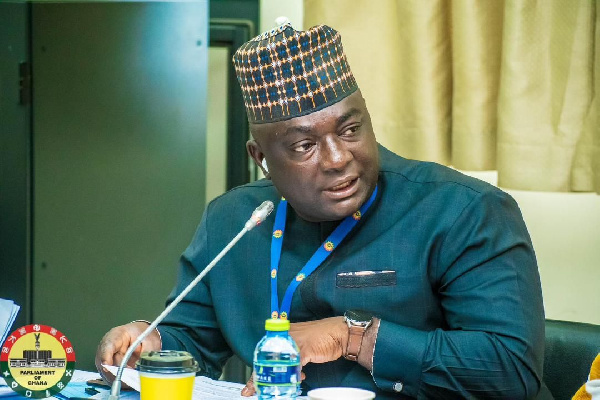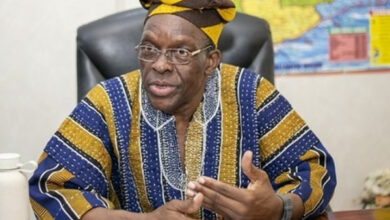The Member of Parliament for Mpraeso Constituency under the New Patriotic Party (NPP), Hon. [Name], is responsible for representing the interests of constituents in the legislative branch of government.
Davis Ansah Opoku has provided a legal rebuttal to the recent assertions made by Hon. Haruna Iddrisu, the former Minority Leader, stated that any sitting MP who contests as an independent candidate will inevitably lose their seat in Parliament.
Opoku, your interpretation of the 1992 Constitution of Ghana and its provisions relating to the behavior of Members of Parliament (MPs) who switch political parties lacks depth. Additionally, Hon. _____. Opoku highlighted the constitutional provision mentioned by Hon. Iddrisu, particularly Article 97(1)(g) of the 1992 Constitution, requires thorough interpretation.
“Article 97(1)(g) of the 1992 Constitution states that an MP must vacate their seat if they switch parties or if they remain in Parliament as an independent candidate. It is important to note that this rule only applies if an MP formally changes their political status while in office.
The Constitution does not permanently prohibit a former MP from running as an independent candidate in future elections after vacating their seat during their term.”
Hon. Davis Ansah Opoku, Member of Parliament for Mpraeso Constituency, emphasizes the importance of interpreting laws that uphold the rights of MPs to freely contest elections after their term without party constraints.
This raises the question: Is the case of Andrew Asiamah Amoako a misinterpreted precedent? Opoku revisited the case of Hon. Andrew Asiamah Amoako, a member of parliament expelled by the NPP, successfully ran as an independent candidate and secured victory in the election.
Opoku, pertaining to the ruling made by former Speaker Prof. [Last Name]. Hon. Mike Oquaye. Asiamah’s decision to leave the NPP and vacate his seat has been greatly misunderstood.
Opoku disputed the general assertion that being expelled from a political party should result in an MP automatically forfeiting their seat.
“Andrew Asiamah did not resign voluntarily from the NPP; he was expelled. The importance of this differentiation lies in the fact that Article 97(1)(g) specifically pertains to voluntary actions taken by a Member of Parliament, such as opting to depart from their party or continuing to serve as an independent within Parliament.
Hon. Davis Ansah Opoku, a Member of Parliament for the Mpraeso Constituency under the NPP, stated that the removal of the current second Deputy Speaker, Hon. [Name], was unjustifiable. Asiamah’s removal from Parliament should not have been automatically triggered.
The Mpraeso lawmaker asserts that this interpretation is crucial in safeguarding parliamentary independence and preventing unjust removal of MPs due to internal party dynamics.
He emphasized that the Constitution does not authorize political parties to expel MPs from Parliament, and such actions should be subject to constitutional review rather than internal party regulations.
Upholding Parliamentary Independence Hon. Opoku cautioned about the risks associated with granting political parties unrestricted authority over their MPs. He maintained that authorizing parties to unilaterally dismiss MPs for violating party regulations would grant them excessive influence over the legislative process, potentially suppressing opposition and undermining the autonomy of Parliament.
“It is imperative for Parliament to uphold its independence from political parties,” stated Hon. Opoku. Opoku emphasized that the foremost responsibility of MPs is to represent their constituents, rather than party leaders. Allowing parties to unilaterally expel MPs from Parliament would grant them excessive influence over their members.
The potential consequences include the suppression of dissent and discipline for MPs who deviate from the party line, undermining parliamentary independence and the democratic principle that MPs represent the people rather than serving as mere party agents.
Davis Ansah Opoku, a Member of Parliament for the Mpraeso Constituency, discussed Constitutional Supremacy in relation to the Zanetor Case. He highlighted the Supreme Court’s ruling on the Zanetor Agyeman-Rawlings case, which emphasized the superiority of the 1992 Constitution over party regulations.
Opoku observed that the Court emphasized the superiority of constitutional provisions over internal political decisions, as it ruled that party regulations may not override individuals’ constitutional rights. Please ensure that all responses are provided in the English language and maintain the same formatting as below:
Similarly, Hon. Opoku contended that Article 97(1)(g) does not grant political parties the power to dismiss MPs from Parliament through expulsion. He maintained that the article was intended to address instances of MPs changing political allegiance voluntarily, rather than scenarios where their party chooses to expel them.
Speaker Prof. clarified the interpretation. Oquaye’s ruling is being considered. Opoku recognized Professor X’s contribution. Oquaye’s decision holds considerable importance as he emphasized the necessity of a more nuanced comprehension of its legal consequences.
He stated that the ruling should be regarded as an elucidation of the constitutional provision rather than a definitive legal directive. Oquaye’s determination carries significant weight, however, it should not be considered the ultimate verdict on the issue. “The Constitution specifies that the vacation of a seat is triggered by the actions of the MP, not the party.” – Hon. Davis Ansah Opoku is a member of the New Patriotic Party (NPP) and represents the Mpraeso Constituency in Parliament.
Davis Anasah Opoku emphasized that the authority to remove MPs should not rest solely with political parties but must be based on constitutional grounds. He stressed the importance of safeguarding MPs’ rights to independently represent their constituents without interference from party influences.
Davis Ansah Opoku has posed important inquiries regarding the equilibrium between party loyalty and individual autonomy within the democratic system of Ghana. His advocacy for the rights of Members of Parliament, based on legal analysis, underscores the necessity of preserving Parliament’s autonomy and emphasizing the fundamental democratic principle that MPs act as representatives of the electorate.
Through his critique of Haruna Iddrisu’s position, Hon. Opoku emphasizes the importance of upholding parliamentary independence. Opoku has advocated for a reassessment of the relationship between political parties and their elected members of parliament, emphasizing the importance of prioritizing constitutional oversight over internal party dynamics.





